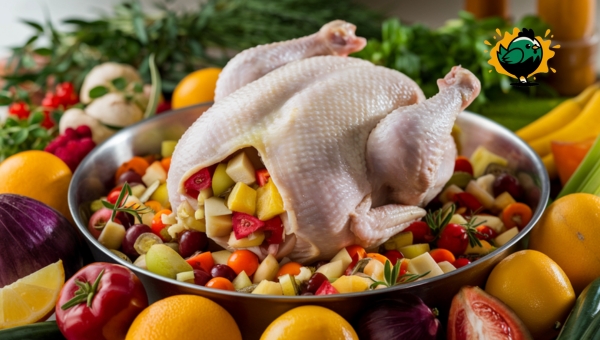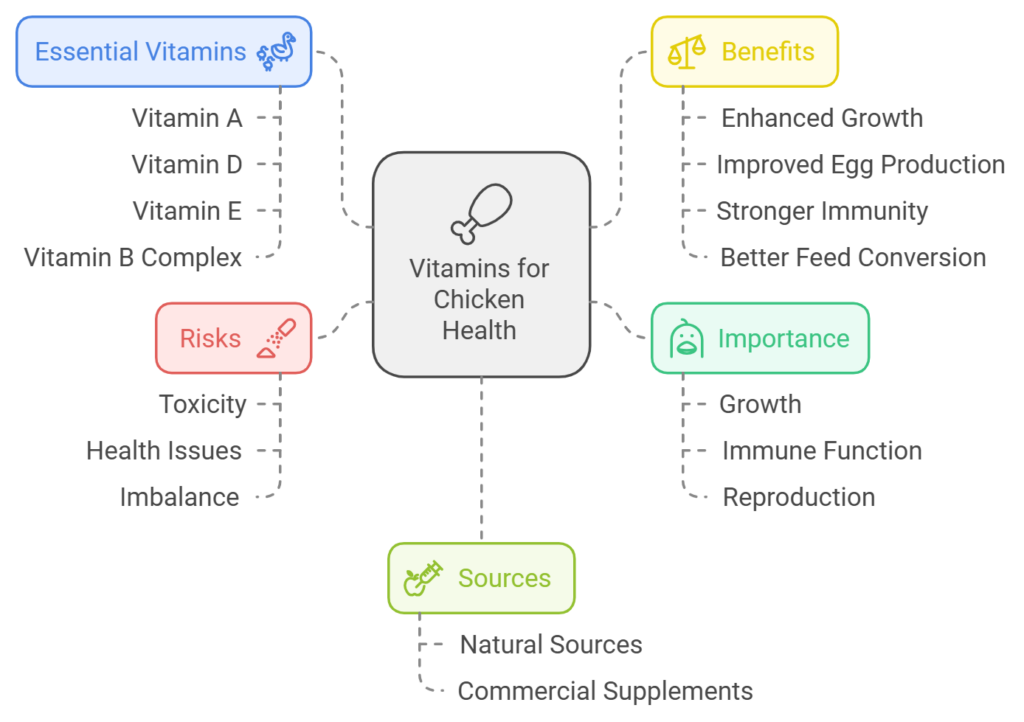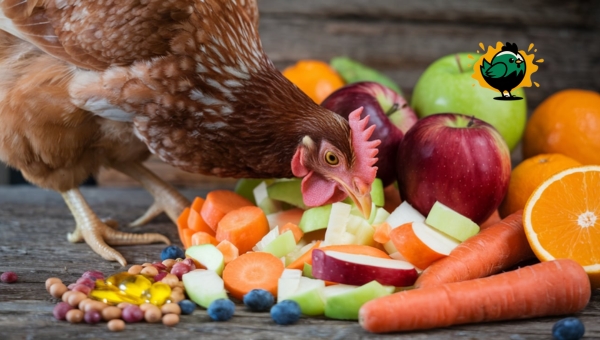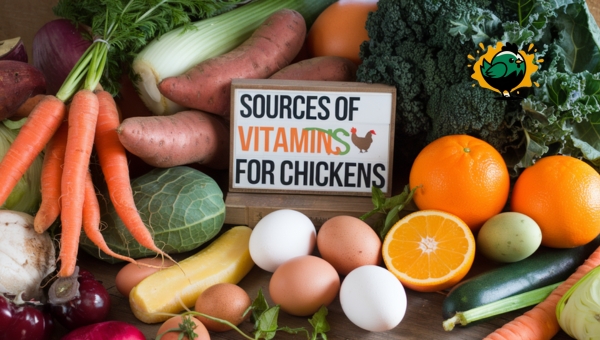Vitamins for Chicken – Boosting Poultry Health

Raising healthy chickens goes beyond just providing them with a safe environment and regular feed. Vitamins play a crucial role in boosting the health of poultry, ensuring they grow strong and resilient. Whether you’re a backyard chicken keeper or managing a larger flock, understanding the right balance of nutrients can make all the difference.
Vitamins not only enhance growth but also fortify their immune systems against diseases, leading to happier birds and better egg production. Imagine vibrant feathers, energetic behavior, and fewer trips to the vet—all achievable with simple vitamin strategies! Ready to transform your chicken-keeping experience? Let’s dive into how vitamins for chicken can revolutionize poultry health.

Importance of Vitamins for Chicken
Vitamins are pivotal in maintaining the health and productivity of chickens. These essential nutrients support various bodily functions, ensuring that chickens grow healthy and strong.
Without adequate vitamins, chickens may face significant health challenges. In the following section, we will explore why vitamins are indispensable for chickens, shedding light on their vital role.

Why do Vitamins Matter?
Vitamins play a fundamental role in a chicken’s overall well-being. They are involved in critical processes like growth, reproduction, and immune system function. For example, vitamin A supports healthy vision and immune response, while vitamin D is crucial for bone health.
Without these nutrients, chickens can suffer from growth issues, reduced egg production, and increased vulnerability to diseases. Therefore, understanding and ensuring proper vitamin intake is vital for any poultry keeper.
Essential Vitamins for Chicken Health
Ensuring the health of chickens involves understanding their vitamin needs. Vitamins play a key role in their growth, immunity, and overall vitality. Each vitamin has a specific function that supports the well-being of chickens. Let’s delve into some essential vitamins and their benefits for poultry.
Vitamin A
Vitamin A is indispensable for chickens, aiding in various aspects of their health.
- Vision: Supports good eyesight, which is crucial for their daily activities.
- Immune Function: Enhances the immune system, helping chickens resist infections.
- Growth and Reproduction: Vital for proper growth and reproductive functions.
- Skin and Feather Health: Maintains healthy skin and vibrant feathers.
Vitamin D
Vitamin D is vital for bone health and overall development in chickens.
- Calcium Absorption: Facilitates the absorption of calcium, essential for bone strength.
- Bone Development: Prevents bone disorders such as rickets in young chicks.
- Eggshell Quality: Contributes to the formation of strong, healthy eggshells.
- Phosphorus Metabolism: Assists in phosphorus metabolism, crucial for skeletal health.
Vitamin E
Vitamin E is important for muscle strength and immune system support.
- Antioxidant Properties: Protects cells from oxidative stress and damage.
- Immune Support: Strengthens the immune system, aiding in disease prevention.
- Muscle Health: Supports muscle function and reduces the risk of muscle disorders.
- Reproductive Health: Plays a role in maintaining reproductive health.
Vitamin B Complex
The B vitamins are essential for energy metabolism and maintaining overall vitality.
- Energy Production: Converts nutrients into energy, supporting daily activities.
- Nervous System Health: Ensures the proper functioning of the nervous system.
- Skin and Feather Maintenance: Contributes to healthy skin and feather condition.
- Growth and Development: Supports overall growth and development in chickens.
Also Read: Broody Chickens – Managing This Special Behavior
Sources of Vitamins for Chickens
Ensuring chickens receive the right vitamins is key to their health and productivity. They can get these vitamins from various sources, helping them grow and stay strong.

Let’s explore natural sources that provide essential nutrients and how commercial supplements can be used to enhance their diet.
Natural Sources
Chickens can benefit from a variety of natural foods rich in vitamins. These foods are not only nutritious but also keep chickens healthy and active.
- Leafy Greens: Spinach, kale, and alfalfa are excellent for providing vitamins A and K.
- Grains and Seeds: Corn, wheat, and sunflower seeds offer B vitamins and vitamin E.
- Fruits: Apples and berries supply vitamins C and A, enhancing overall health.
- Vegetables: Carrots and sweet potatoes are high in vitamin A, supporting vision and growth.
Commercial Supplements
For poultry keepers looking to ensure a balanced diet, commercial supplements can be an effective solution.
They are specially formulated to meet the dietary needs of chickens.
- Vitamin Mixes: Available in powder or liquid form, these contain a blend of essential vitamins.
- Pellets: Enriched with vitamins, they can be mixed with regular feed.
- Liquid Supplements: Easy to administer in water, providing an instant vitamin boost.
- Specialized Products: Designed for specific needs, such as boosting egg production or supporting growth.
Benefits of Supplementing Chicken Diet
Supplementing a chicken’s diet with vitamins can significantly enhance their overall health and productivity.
Here are the key benefits:
- Enhanced Growth: Vitamins support optimal growth rates, ensuring chickens reach their full potential.
- Improved Egg Production: A well-supplemented diet can increase both the quantity and quality of eggs produced.
- Stronger Immunity: Vitamins boost the immune system, helping chickens resist diseases more effectively.
- Better Feed Conversion: Efficient nutrient absorption is promoted, leading to improved feed conversion rates.
Incorporating the right vitamins into their diet is crucial for maintaining robust health and maximizing productivity in poultry. This not only benefits the chickens but also ensures higher yields for poultry keepers.
Potential Risks of Over-Supplementation
While vitamins are essential for maintaining chicken health, providing too many can have adverse effects. Over-supplementation can lead to health complications that might affect their overall well-being. It’s vital to understand these risks to ensure chickens receive appropriate nutrition.
Understanding Risks
Excessive vitamin intake in chickens can lead to several health issues:
- Toxicity: Overconsumption of fat-soluble vitamins, like A, D, and E, can accumulate in the body, leading to toxic effects.
- Health Issues: Symptoms such as weakness, poor growth, or metabolic disorders might arise from too many vitamins.
- Imbalance: High levels of one vitamin might interfere with the absorption or function of others, disrupting overall health balance.
It’s crucial to monitor and provide the right amount of vitamins to avoid these risks.
Also Read: Best Food for Egg Production [Boost Your Flock’s Health]
Tips for Providing Vitamins to Chickens
Providing the right vitamins for chickens is essential for their health and productivity. Here are some practical tips to ensure your flock gets the nutrients they need:
- Balanced Diet: Ensure their feed contains a variety of nutrients. Look for feeds labeled as complete, which are designed to meet their dietary needs.
- Natural Sources: Incorporate fruits and vegetables like leafy greens and seeds into their diet for a natural vitamin boost.
- Monitor Health: Regularly observe your chickens for signs of vitamin deficiency or excess, such as changes in feather quality or behavior.
- Consult Professionals: When unsure, seek advice from a veterinarian or poultry nutritionist to tailor vitamin supplementation to your flock’s specific needs.
FAQs
Which vitamins are crucial for chickens?
Key vitamins for chickens include Vitamin A for vision and skin health, Vitamin D for bone strength, Vitamin E for immune function, and the Vitamin B Complex for energy metabolism.
Can chickens get vitamins from natural food sources?
Yes, chickens can obtain vitamins from natural sources like leafy greens, grains, seeds, and some fruits. These foods provide essential nutrients needed for their well-being.
Are commercial vitamin supplements necessary for chickens?
While natural sources are beneficial, commercial supplements can help ensure chickens receive a balanced mix of essential vitamins, especially if their diet lacks variety.
What are the risks of giving too many vitamins to chickens?
Over-supplementation can lead to toxicity, particularly with fat-soluble vitamins, and may cause health issues or nutrient imbalances. It’s important to provide vitamins in appropriate amounts.
Conclusion
Vitamins for chickens are vital to their health, supporting growth, immunity, and overall well-being. By ensuring a balanced intake of essential vitamins, chickens can thrive, producing better eggs and maintaining strong health.
It’s important to monitor their diet carefully to avoid any risks associated with over-supplementation. Providing natural sources and carefully selected supplements can make a significant difference in their quality of life. Remember, a well-nourished chicken is a happy and productive one.
If you found this information helpful, explore more insightful articles on our site to enhance your poultry care knowledge!
